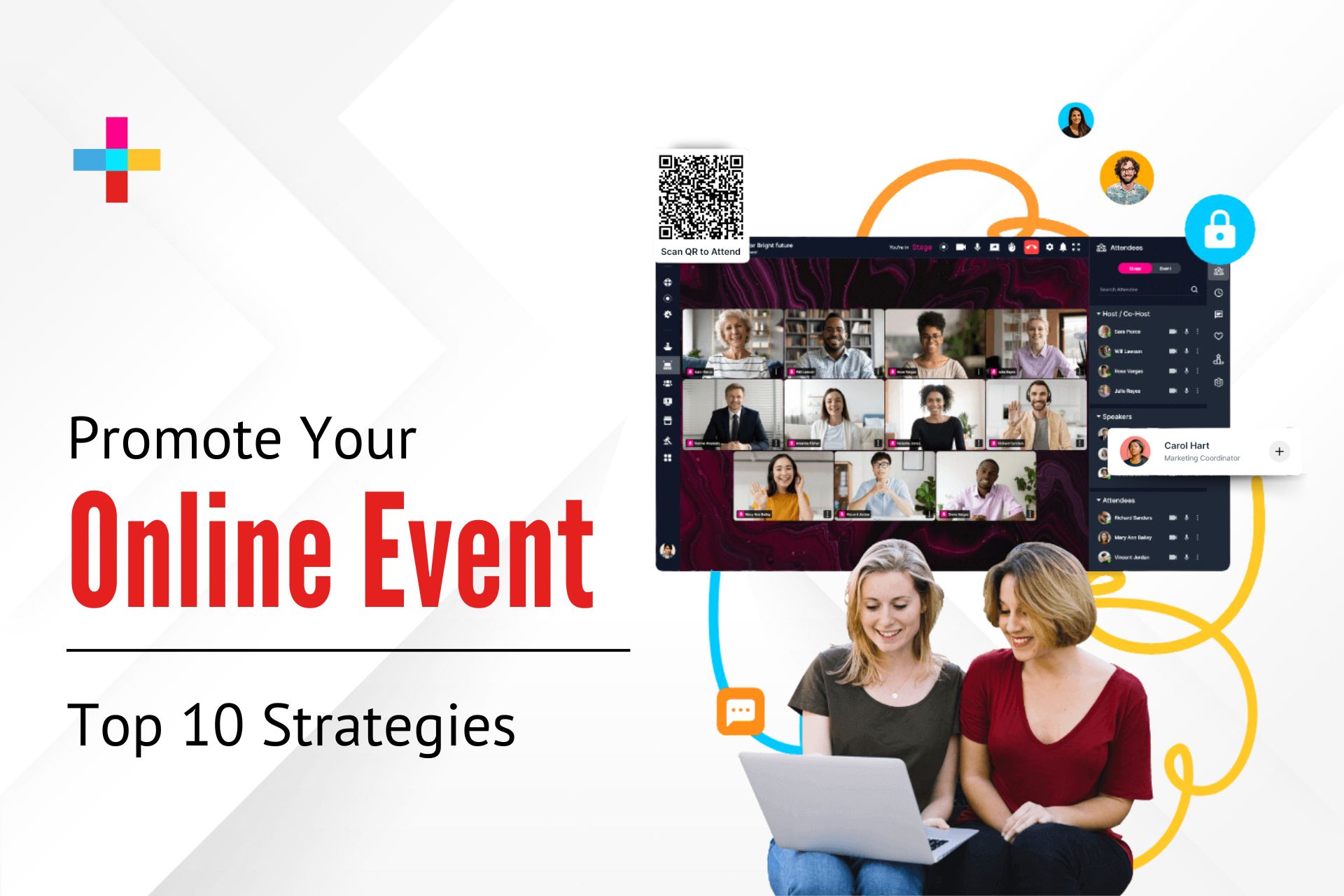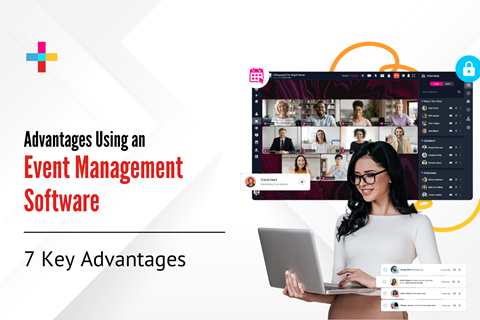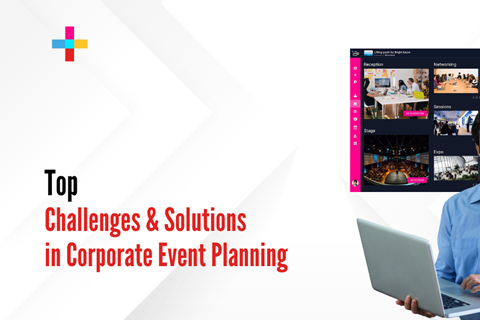Top 10 Strategies to Promote Your Online Event

Jan 31, 2025 Admin
The virtual events market has seen exponential growth, becoming a vital channel for organizations to engage, educate, and connect with their audiences. According to Statista, the global event industry is projected to grow to more than $2 trillion by 2028.
For event organizers, this growth presents both opportunities and challenges. While virtual events offer unmatched convenience and scalability, standing out amidst fierce competition requires more than just planning an event.
In this blog, we’ll explore 10 effective strategies to market your online event successfully. Whether you’re hosting an intimate webinar or a large-scale virtual conference, these actionable tips will help you boost visibility, drive registrations, and create a memorable experience for your attendees.
How To Market Your Online Event: 10 Effective Strategies
1. Develop a Comprehensive Event Website
Your event website is the foundation of your online marketing efforts. It’s where potential attendees come to learn about your event, assess its value, and decide to participate. A strategically designed website ensures that every visitor has a seamless, engaging experience, from exploring the agenda to completing their registration.
For planners looking for an efficient way to build an impressive event website, Eventcombo’s Event Website Builder is the ultimate solution. With professionally designed templates and fully customizable features, you can create a stunning website in minutes without needing advanced technical skills.
Key Features of a Great Event Website:
- Event Overview: Start with a concise yet compelling summary of your event’s purpose, theme, and target audience. Use strong visuals and a bold headline to capture attention immediately.
- Registration Section: A straightforward registration process is critical. Ensure the call-to-action (CTA) buttons are visible, the forms are intuitive, and the payment gateways are secure and reliable.
- Speaker and Performer Profiles: Add credibility by including photos, professional bios, and links to past achievements or talks. Let attendees know why they can’t miss these industry leaders.
- Detailed Agenda: List session titles and start times, along with their formats (e.g., panel discussions, networking). Include any special highlights, such as keynote speeches or interactive Q&A sessions.
- FAQs and Support Options: Preemptively answer common questions with a detailed FAQ section. Provide easy access to 24/7 human support or a chatbot for immediate assistance.
Optimization Tips:
- Mobile Responsiveness: Ensure your website functions seamlessly on all devices, as a significant number of users will visit from smartphones or tablets.
- Fast Loading Speed: Optimize images and streamline the website’s backend to minimize loading times. Slow pages often lead to higher bounce rates.
- Analytics Integration: Use tools like Google Analytics to track visitor behavior, registrations, and engagement. These insights can help you refine your strategy.
Pro Tip: Add a clear "Save to Calendar" button on your event website. This ensures potential attendees can easily add the event to their schedules, reducing the chances of forgetting or missing it.
2. Utilizing Email Marketing for Direct Outreach

Email marketing remains one of the most effective tools for promoting virtual events. Its ability to deliver personalized messages directly to your audience ensures higher engagement and conversion rates compared to broader promotional methods.
Steps to Create Impactful Email Campaigns:
- Segment Your Audience: Divide your email list based on factors like demographics, industry, or past interactions with your events. This allows you to craft tailored messages that resonate with each group.
- Craft Engaging Subject Lines: The subject line is the first impression of your email. Make it concise, intriguing, and action-oriented to encourage openness.
- Provide Value: Highlight what makes your event unique, whether it’s an industry-leading keynote speaker, a cutting-edge topic, or exclusive networking opportunities.
- Add Clear CTAs: Include prominent call-to-action buttons that lead directly to your registration page.
- Automate Follow-Ups: Use email automation tools to send reminders, updates, and thank-you messages at key intervals, ensuring attendees stay engaged before the event.
To streamline your efforts, Eventcombo’s Email Marketing Engine enables you to create personalized, on-brand emails with ease. It also automates follow-ups, ensuring consistent engagement with your audience.
3. Harness the Power of Social Media

Social media platforms are indispensable when it comes to promoting an online event. With billions of active users worldwide, platforms like LinkedIn, Instagram, Facebook, and Twitter allow you to connect with diverse audiences and build excitement leading up to your event. A strategic social media campaign can amplify your message and turn followers into attendees.
Strategies for Effective Social Media Promotion:
- Choose the Right Platforms: Focus on platforms where your target audience is most active. For professional or industry-specific events, LinkedIn may be the go-to platform, while Instagram and Twitter can work well for creative or younger audiences.
- Create a Hashtag: Develop a unique, memorable hashtag for your event to centralize conversations and encourage user-generated content. For example, #FashionForward2025, #FutureTech2025 or #WiredForSuccess.
- Schedule Regular Posts: Maintain a consistent posting schedule to keep your event on your followers’ radar. Share updates like speaker announcements, behind-the-scenes preparations, and teasers for key sessions.
- Engage Your Audience: Respond to comments, answer questions, and encourage shares. Interactive content like polls, Q&A sessions, and contests can significantly boost engagement.
Pro Tip: Focus on platform-specific tools to enhance promotion. Use LinkedIn Events for professional outreach, Instagram Stories for real-time updates, and Facebook Groups to build a dedicated community for your event.
4. Collaborate with Influencers

Influencers bring established audiences and trusted voices that can help create buzz and drive attendance. By collaborating strategically, you can tap into niche communities and attract attendees who are genuinely interested in your event.
How to Identify the Right Influencers:
- Relevance OverreachOver Reach: Focus on influencers whose followers align with your target audience. A micro-influencer with a niche following can often deliver better results than a generic, high-profile influencer.
- Assess Authenticity: Look for influencers who consistently engage with their audience through meaningful interactions, as authenticity builds trust and boosts conversions.
- Create Co-Branded Campaigns: Partner with influencers to design joint campaigns, such as social media takeovers or giveaways. This will help attract attention and drive registrations.
- Measure Impact: Use unique referral codes or affiliate links to track the performance of each influencer collaboration, ensuring your efforts are data-driven and effective.
Pro Tip: Schedule a post-event recap with influencers to share their experiences and highlights. This not only keeps the momentum going but also sets the stage for future collaborations.
5. Implement Search Engine Optimization (SEO)
Search Engine Optimization (SEO) is a critical component of marketing your online event. By optimizing your content and website for search engines, you can increase visibility, attract organic traffic, and drive more registrations. This will ensure that when people search for topics related to your event, your content appears prominently in the results.
Key Steps to Optimize for Search Engines:
- Target the Right Keywords: Conduct keyword research to identify phrases your audience is searching for, such as "how to market an event online" or "best practices for virtual events." Integrate these strategically across your website and content.
- Optimize Event Pages: Each page on your website, from the registration page to the agenda, should have clear meta descriptions, keyword-rich titles, and descriptive alt text for images.
- Create High-Quality Content: Publish blogs, articles, and resources related to your event’s themes or key topics. For example, a tech conference could feature articles on emerging industry trends.
On-Page and Off-Page Tactics:
- Internal Linking: Link between your event pages to guide visitors and improve SEO rankings. For instance, a blog post about the event’s keynote speaker should link to the registration page.
- Backlinks from Authoritative Sites: Reach out to industry publications, influencers, or partners to link to your event page. These backlinks boost credibility and improve search engine rankings.
- Mobile and Speed Optimization: Ensure your site loads quickly and is fully responsive on all devices, as search engines prioritize user-friendly websites.
Track site performance, identify traffic sources, and find areas for improvement using analytics tools like Google Analytics or SEMrush.
Pro Tip: Use local SEO if your event has a regional focus by including location-specific keywords and registering your event on platforms like Google My Business.
6. Invest in Paid Ads

While organic promotion is essential, paid advertising can significantly amplify your event’s reach and ensure it gets in front of the right audience. Paid campaigns allow you to target specific demographics, interests, and behaviors, ensuring every dollar you spend works toward attracting qualified attendees.
Tips for Effective Paid Campaigns:
- Set clear goals for your paid ads, such as driving registrations or boosting brand awareness.
- Use dynamic ads to showcase event details personalized for each viewer.
- Highlight exclusive features, such as VIP sessions or giveaways, to drive interest.
- Retarget high-intent users, especially those who abandoned the registration process.
- Monitor cost-per-acquisition (CPA) to ensure your campaigns stay cost-efficient.
- Align ad copy and visuals with landing pages for a seamless user experience.
- Implement conversion tracking to measure the direct impact of your ads.
- Refine your campaigns based on data to maximize ROI.
Pro Tip: Combine retargeting with lookalike audiences to amplify your reach. By targeting users similar to those who’ve already shown interest or registered, you can attract high-potential attendees while maximizing the efficiency of your ad spend.
7. Collaborate with Sponsors and Partners to Amplify Your Reach

Your event sponsors and partners are invaluable allies in amplifying your event’s reach. By tapping into their established networks, you can significantly enhance your marketing efforts and attract a broader audience. These organizations have a vested interest in the success of your event, making them enthusiastic advocates for spreading the word.
Strategies to maximize sponsor and partner support:
- Provide Marketing Assets: Share branded materials like social media graphics, email templates, and pre-written content that sponsors and partners can easily share. This ensures consistency in messaging and saves them time.
- Utilize Their Channels: Encourage sponsors and partners to promote your event on their social media platforms, newsletters, and websites. Their audience often aligns with your target demographic, making their outreach highly effective.
- Highlight Their Involvement: Feature your sponsors and partners prominently on your event website and promotional materials. This incentivizes them to promote the event to showcase their participation.
- Create Co-Branded Campaigns: Collaborate with sponsors and partners on joint promotions, such as giveaways, exclusive content, or webinars that lead up to the event.
- Use Testimonials and Endorsements: Request quotes or endorsements from sponsors and partners to add credibility to your event promotions. Share these testimonials on your website and social channels.
Pro Tip: Set clear expectations with your sponsors and partners regarding promotional activities by including these efforts in your partnership agreements. Offering additional perks, such as exclusive branding opportunities, can further motivate them to market the event actively.
8. Offer Early Bird Discounts and Incentives

Creating a sense of urgency with early bird discounts and incentives is a time-tested strategy to encourage prompt registrations. These offers reward quick decision-makers and also help you gauge initial interest and build momentum for your event.
Popular Incentive Ideas:
- Discounted Ticket Prices: Offer a significant reduction in ticket costs for those who register within the first few weeks of the launch.
- Exclusive Perks: Provide early registrants with added value, such as access to bonus sessions, exclusive networking opportunities, or premium materials.
- Group Discounts: Encourage teams to join by offering discounts for bulk registrations. This is especially effective for corporate or educational events.
- Limited-Time Merchandise: Include branded items, such as T-shirts or eBooks, for those who sign up early.
Promoting Your Offers:
- Announce Clearly: Highlight the early bird offer prominently on your website, social media, and email campaigns. Use countdown timers to emphasize the limited availability.
- Create Tiered Pricing: Gradually increase ticket prices as the event date approaches to incentivize early action. For example, Early Bird → Standard → Last-Minute.
- Utilize Social Media: Share posts featuring the offer deadline, emphasizing the benefits of registering now.
Pro Tip: Create social media challenges or contests tied to early registrations, such as giveaways for the first 50 sign-ups or random draws among early bird registrants.
9. List Your Event on Online Calendars and Communities
One of the most efficient ways to increase visibility for your online event is by listing it on popular event calendars and engaging with relevant online communities. These platforms are frequented by individuals actively seeking events, making them valuable channels for reaching an interested audience.
Top Online Event Calendars to Consider:
- Meetup: Ideal for niche or community-focused events, Meetup connects like-minded individuals to gatherings that align with their interests.
- 10Times: This platform specializes in event promotion and caters to professional and corporate audiences.
- Industry-Specific Websites: Look for sector-focused sites or associations that host event calendars, such as those for tech, education, or healthcare.
Engage with Online Communities:
- Social Media Groups: Share your event in LinkedIn groups, Facebook communities, or subreddits related to your industry. Tailor your messaging to each community's preferences.
- Forum Discussions: Participate in forums like Quora or industry-specific discussion boards, subtly introducing your event where relevant.
- Professional Associations: Partner with organizations that can promote your event to their members through newsletters, bulletins, or member boards.
Pro Tip: Use analytics tools to track which platforms drive the most traffic or registrations and focus your efforts on the highest-performing channels.
10. Utilize Webinars and Live Pre-Event Sessions

Hosting webinars and live sessions before your event is an effective way to engage your audience, build anticipation, and provide a taste of the value they can expect. These pre-event activities act as interactive touchpoints, helping attendees form a connection with your event and speakers while answering any questions they may have.
Strategies for Successful Pre-Event Sessions:
- Feature Key Speakers: Host a Q&A or panel discussion with your event’s headline speakers. This gives attendees a chance to interact directly and see the value of participating in the main event.
- Highlight Event Content: Use the session to introduce your event’s themes, preview high-demand sessions, or share behind-the-scenes details.
- Make It Interactive: Use polls, live chats, and audience questions to keep participants engaged and involved. An interactive format creates a stronger connection with your attendees.
- Record and Share: Record your webinars or live sessions and repurpose them as promotional content on your event website, social media, or email campaigns for those who couldn’t attend.
- Answer FAQs: Address common questions or concerns about the event, helping to reduce any barriers to registration. This also shows that you're prepared and focused on attendee experience.
Practical Tips for Execution:
- Promote Effectively: Announce the webinar across your channels well in advance. Use email reminders and social media posts to ensure strong attendance.
- Choose the Right Tools: Use reliable platforms like Zoom, Microsoft Teams, or Eventcombo’s Fireworks Virtual Platform for seamless integration, engagement, and reliable performance.
- Offer Incentives for Participation: Provide attendees with perks like exclusive discounts or priority registration for joining the live session.
Pro Tip: Use pre-event webinars to collect attendee preferences and feedback through surveys or polls, helping you tailor your event to their needs.
Conclusion
Successfully promoting an online event requires a balanced mix of strategic planning and creative execution. It’s not just about spreading the word—it’s about creating touchpoints that resonate with your audience. Each interaction should inspire interest, spark engagement, and foster lasting connections.
Effectively managing these touchpoints can be challenging, but Eventcombo simplifies the process. This all-in-one event tech platform streamlines every aspect of event planning—from registration to marketing—so that you can focus on delivering an impactful and memorable experience for your attendees.
Let Eventcombo take the complexity out of your planning. Book a demo today to see how it can help you create events that stand out and drive results.
close















